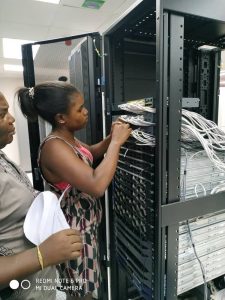
Women in the ICT sector: challenges and achievements
“Women should let their light shine, stand up for what they believe in and embrace technology.”
Less than a third of women worldwide work in scientific research & development (UNESCO UIS, 2018). In Sub-Saharan Africa, only 30% of professionals in the tech industry are women. At GVG, a leading company in the sector, we are fortunate to have several women holding positions in the technical department. One of them, Gladys Barbirye, tells us about her experience in a predominantly masculine industry, her current perspective of the situation and her hopes for the future.
Deciding to study a “men’s career”
“I wanted to be a lawyer”, says Gladys, “but I was topping my class in the Science subjects. I guess God was telling me something here”. Although Gladys’s vocation may have come to her by chance, all her achievements stemmed from sheer effort: “For my advanced level of secondary education, I did subjects in physics, chemistry and mathematics. I was very good at these subjects, and was eventually admitted at Makerere University’s School of Engineering, where I embarked on my electrical engineering degree. I majored in telecommunication engineering, and I can honestly say I do not regret it one single bit.”
Gladys tells us what the situation of women in the technology sector was like when she was studying: “It was challenging. But I must say that the majority of the women in the School of Engineering had this positive energy around them and were not intimidated by any situation. The challenges were always there, whether visible or invisible. But we stood firm by supporting each other.”
A society divided between prohibition and pride
According to the World Economic Forum, only 3% of students joining ICT courses across the globe are women. Gladys is very clear about the reason behind this situation: “Society. In many African societies […] girls need to stay at home to do household chores, while the boys go to school.”
She goes on: “I believe sensitization and open-mindedness are key factors in encouraging a higher inclusion of women in the ICT sector.” A shift is already visible: Increasingly, when a woman becomes an engineer, it is a source of pride for her family. “My father, when introducing me to any of his colleagues, always addresses me as Engineer Gladys, with so much pride. It is humbling, because my dad ensured I pursued my engineering course and was not intimidated by anyone.”
Long way to go in the business world
Technology has led to a dramatic change in society at many levels: education, infrastructures, financial inclusion… Understanding the opportunities that are yet to come in this field, we asked Gladys how she envisions the medium-term future of women in this industry in Africa: “Companies should value women’s ideas and consider them at the round table.”
And what about the tech companies that are getting started with diversity and inclusion? Gladys is blunt: “These companies had better be prepared in terms of bad press […]. Some people still believe females should not be included at the round table because they do not have solid ideas to offer. The financial stakes are high for these tech companies, especially when not getting the buy-in of a society that believes products engineered by women are of a lower quality standard.”
Finally, Gladys sends a message to the girls who are reluctant to focus their studies on this sector. “It’s a tough world out there. Getting your ideas across will be challenging, but stand your ground!”

Want to know more about the ICT sector in this new normal? Click here.
